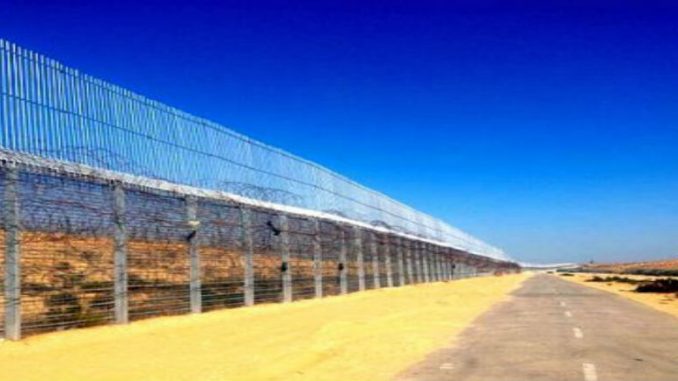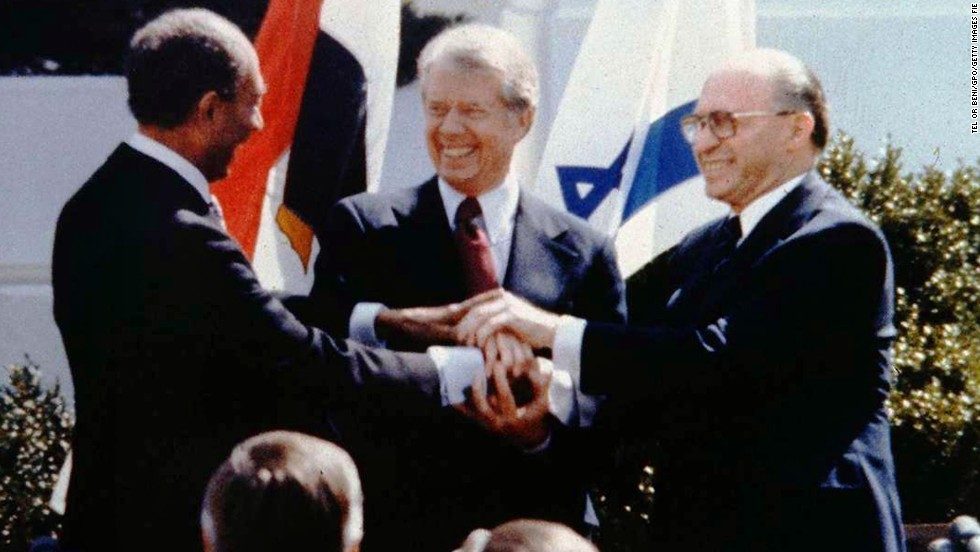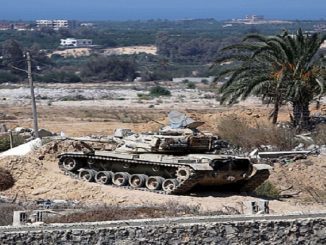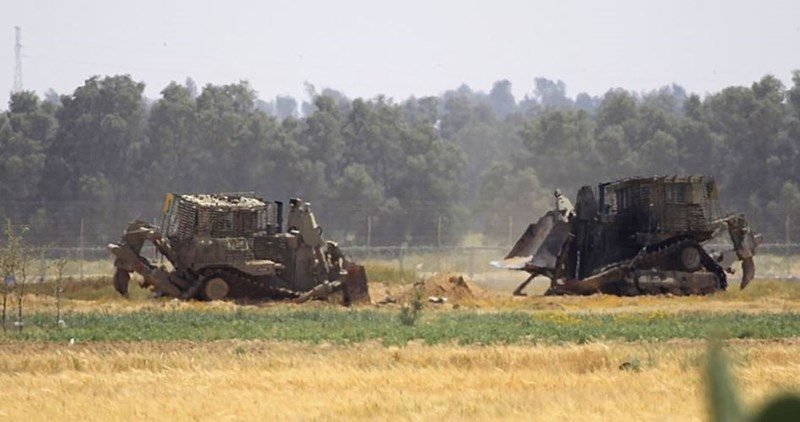
Israel has announced that it has finished raising the height of an electronic fence along part of its border with Egypt to shut down irregular migration routes.
The 242-kilometer (250 mile) barrier, stretching from the Gaza Strip to Eilat, was completed in 2014.
The electronic fence is equipped with warning systems and information collection centers to tackle illegal migration, drug and weapons trafficking and infiltration by “terrorists”,said the Israeli Defense Ministry.
According to the Fence Administration, headed by Brigadier General Eran Ofir and the Department of Engineering and Construction at the Ministry of Defense, the fence slashed the number of African migrants arriving in Israel, but some managed to breach the fence.
In 2015, smugglers from Sinai succeeded in partially overcoming certain areas of the barrier and the number of infiltrators suspended by security officials on the Israeli side of the fence rose to 213.
Due to the increased number of infiltration attempts, the Ministry of Defense and the IDF decided to increase the height of the fence as a way to prevent future illegal crossings.
Accordingly, in the recent months, the height of the fence was elevated from five to eight meters (15 to 25 feet) along a 17-kilometer (10-mile) stretch, said the Israeli Defense Ministry.
It also added that the plus additional detection devices had “significantly curbed the flow of illegal infiltration into Israel, with only 11 successful attempts to cross the fence throughout 2016.”
Israel Is Securing its Borders With the Assistance of Al-Sisi Regime
In fact, Israel is securing its borders with the assistance of al-Sisi military regime in Egypt as both are engaged in various security cooperation in Sinai.
Since al-Sisi military coup against Egypt’s first democratically elected President Mohamed Morsi in 2013, the Egyptian-Israeli relations have flourished in an unprecedented way.
Israel has allowed modifications to the security annex of the Camp David Accords.In two dozen occasions” Israel allowed Egypt to deploy troops and equipment, including aircraft that were previously prohibited by the treaty,”said David Schenker -the director of the Program Arab Politics at Washington Institute, in an interview last December 2016.
On the other hand, the Israeli Air Force is taking part in the attacks against ISIS in Sinai and the IDF’s Military Intelligence Unit 8200 is assisting Egyptian forces to collect and decipher information about Sinai Province, according to foreign reports.
In this context, it has been revealed that Israeli drones have been given permission by the Egyptians to strike targets in the Sinai Peninsula. This claim came one week after similar remarks that were made by a retired Israeli official, who revealed that Israel’s drone attacks during the previous year were planned in full cooperation with the Egyptian army.
In addition, intelligence sharing about threats in the peninsula is also boomed– in 2016 Major General Yair Golan, Israel’s Deputy Chief of Staff, described it as “unprecedented.”
Moreover, the Egyptian-Israeli relations have also flourished on the political level.
Based on various media reports, the Israeli Prime Minister Benjamin Netanyahu and al-Sisi talk frequently with one another. Some articles even said that they talked “as much as once a week.”
In the same context, al-Sisi sent his foreign minister, Sameh Shoukry, to Jerusalem, to meet with Netanyahu in 2016. Egypt’s foreign minister visit to Israel, which was the first such in nine years, inferred the development in diplomatic relations between both countries.
Schenker explained that both Netanyahu and al-Sisi have common views regarding few key issues beyond fighting the insurgency in Sinai. One of the main issues that both countries have common views on considering “Hamas as a threat.”
As Al-Sisi Regime Secures Israel, Sinai People Suffer Insecurity, Rights Violations And Evictions
On the contrary, Sinai people are suffering from human rights violations and evictions at the time al-Sisi’s government is maintaining Israel’s safety.
Al-Sisi’s government has destroyed hundreds of homes on the Egyptian side of Rafah last year, which straddles both Sinai and Gaza, in order to create a “buffer zone”.
Human Rights Watch has stated in a report released in 2015 that,” From July 2013 to August 2015, at least 3,255 homes, community buildings, and offices in the Sinai Peninsula along the border with the Gaza Strip have been destroyed by the Egyptian forces. The army has forcefully evicted and displaced families as part of a long-considered plan to establish a “buffer zone” with the Gaza Strip.”
Al-Sisi government has justified the buffer zone saying that it was a part of a policy to break down the smuggling tunnels that would allow fighters and weapons to be transferred from Gaza to the Sinai, a claim never proved.
Furthermore, the residents of Sinai region often complain of heavy-handed tactics by security forces, including collective punishment and extrajudicial killings, following particularly deadly attacks against government forces.
In fact, the security campaign grew more deadly and vigorous as the Egyptian military and police forces have been the target of ongoing attacks which have increased since the military coup in 2013.
Ansar Beit al-Maqdis, the militant group responsible for a majority of attacks on military personnel, aligned with the Islamic State group in November 2014, changing its name to “Sinai Province”.
Sinai Province has targeted Egypt’s security forces in various attacks, mostly roadside bombings, and ambushes, as well as operations against security checkpoints.
As a result, the Egyptian armed forces launched an excessive campaign to uproot ISIS from the eastern peninsula bordering Israel and the Palestinian Gaza Strip.
However, Sinai civilians have increasingly been targeted in the crossfire between security services and Islamic militants.
In addition, the Egyptian government is accused of killing suspects in detention before claiming they were killed in shootouts.
According to a Human Rights Watch, the government said that its counter-terrorism operations in north Sinai killed at least 3,091 “terrorists” between January and July 2015.
According to Arab Organization for Human Rights, a London-based organization, reported that more than 361 people were killed in Sinai by the Egyptian army in 2014 for allegedly being wanted for terrorist activities.
The government releases little information about such operations and threatens journalists who report about them.
In August, Abdel Fattah al-Sisi issued a law that provides for a fine of up to 500,000 Egyptian pounds (US$64,000) and a year-long work ban for anyone who reports information about terrorism that contradict the government.
In addition, nearly 1481 people have been arrested for the same reasons without a shred of evidence or legal due process, the organization said.



